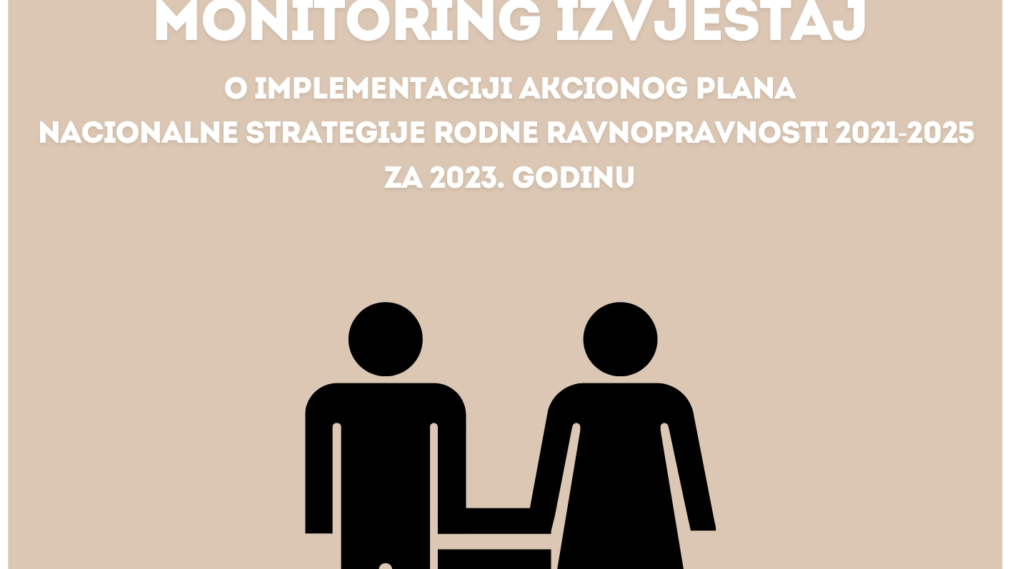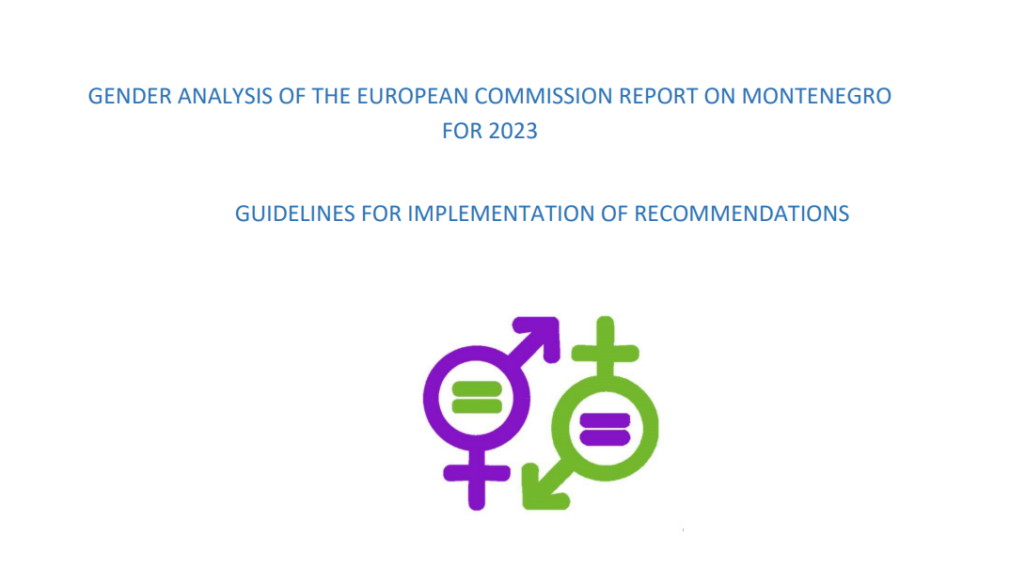1504Views 0Comments

WRC comments on the medium-term Government work program
Podgorica, 10. January 2022.
General comments
1. It is necessary that gender equality as a principle is integrated and horizontally applied to all laws, policies and measures whose drafting is planned, as well as to each individual goal of this Program, as provided by the Law on Gender Equality.
Gender mainstreaming means ensuring that a gender perspective and focus on gender equality is an integral part of policy planning and development, research, advocacy / dialogue, legislation, resource allocation, implementation and monitoring of programs and projects, so that their implementation value reflected on social life and characterized all its aspects. The current program is insufficiently based on this type of data and analysis, although some have already been used for the development of the National Strategy for Achieving Gender Equality 2022-2025, but also for the development of other related sectoral policies.
Recommendations:
- Conduct mandatory ex ante gender impact assessments to inform all measures and define goals that contribute to achieving gender equality.
- Impact indicators need to contain gender-disaggregated data wherever possible.
2. Bearing in mind that one of the basic categories within the methodology of monitoring the Action Plan is the item “Funds for the implementation and information on the development of RIA”, it is necessary that the Report on the Impact Assessment (RIA) , contains the question: “In what way will the regulations in the regulation affect women and men separately – enumerate the positive and negative impacts, direct and indirect”. This activity is envisaged by the Gender Equality Strategy 2021-2025, and it is necessary to compare the Government’s Work Program in that sense.
Recommendations:
• Implement amendments to the Form of the Regulatory Impact Assessment (RIA) Report, by introducing the question in Part 4. Analysis of the Impact: “How will the solutions in the regulation affect women and men separately – list the positive and negative influences, direct and indirect”
• Align the manual for analysis of the effects of regulations with the methodology and guidelines for policy planning.
3. When it comes to performance indicators, we believe that it is not enough to indicate that the Law, Report or other key document has just been adopted, but also whether and to what extent it is in line with relevant international standards and obligations, and that it reflects how the proposed measure will affect the desired change.
In this way, the quality of legislative solutions is ensured, and laws are created with the clear goal of improving certain areas, and the procedural approach when creating policies is discouraged.
Recommendations:
- Formulate relevant indicators in a way that they also contain information on the compliance of laws with relevant international standards and obligations, and that they reflect how the proposed measure will affect the desired change.
4. Evaluation of the existing strategic and legislative framework, primarily the level of implementation of the previous National Strategy for Achieving Gender Equality, but also a detailed analysis of the situation in certain areas showed that the level of gender equality is still unsatisfactory. Such an assessment was given in this year’s report of the European Commission on Montenegro, both through priority recommendations and comments on special negotiating chapters. The assessments from the international reports on the application of legally binding standards in the field of non-discrimination, combating violence against women, etc. are similar (CEDAW, GREVIO, UPR ..)
In this context, we suggest the following:
- The assessments and conclusions of the European Commission and international bodies that monitor the application of ratified international standards should be translated into concrete measures with appropriate impact indicators.
- Provide a single document for monitoring Montenegro’s international obligations in the field of respect for human rights and gender equality, in order to facilitate monitoring and compliance of proposed laws and measures with commitments that are part of key documents and recommendations, especially related to: SDG, CEDAW, GREVIO, UN Security Council Resolution 1325, Beijing Platform for Action, etc.
- Align indicators with already adopted sectoral policies / Action plans governing related areas
- In cases of measurable indicators, we suggest the introduction of incentives and recognition for those institutions that promote gender equality (such as UNDP Gender Equality Seal, where a similar certificate would be established at the state level), which will contribute to the visibility of the institution, affirmation the principle of “leading by example” and drawing attention to the importance of gender equality.
PRIORITY 1: RULE OF LAW AND EQUAL OPPORTUNITIES
Objective 1.1. Improve the efficiency of the judiciary
In the past, the state has failed to provide an adequate response to cases of structural violence against women and systemic violations of women’s human rights. The system support system for victims is very weak, and numerous omissions have occurred when it comes to specific cases of violence that needed to be processed in a timely manner. Accordingly, it is necessary to formulate clear procedures in the treatment of victims, which would include minimum standards for the protection of victims, and thus provide a quality regulatory framework aimed at the victim. It is essential that institutions respect the principles and rights of victims, especially the police and the prosecution. In this regard, we propose a certain structuring of this coordination, so that the work of all involved institutions in this area is more efficient, concrete results are achieved, and cooperation between institutions is established. It is important that the Government recognizes the importance of this problem, and that decision-makers are involved in adopting a cross-sectoral approach to addressing this issue.
Within this goal, it is necessary to include the activities already agreed by the Working Group for Chapter 23 in the form of recommendations addressed to the competent institutions. We suggest some of the priority activities:
- The Government to analyze the existing inefficient system for the protection and support of victims of gender-based violence and violence against children and to develop guidelines for the establishment of a new coordinated system that will place the rights and best interests of victims at the heart of all measures.
- Align the Criminal Code and the Law on Protection from Domestic Violence with the standards of the Istanbul Convention and EU directives for the protection of victims’ rights and the practice of the European Court of Human Rights in this area.
- Align case law in the field of violence against women and domestic violence with the standards
- Establish a harmonized database on domestic violence and violence against women and children containing data from all relevant institutions, classified by type of violence as defined by the Istanbul Convention, gender of victims and perpetrators,% of crimes and misdemeanors,% of convictions,% of acquittals judgment,% reprimand, rejection, etc .; type of punishment (fine, imprisonment, etc.),% of imposed protective and security measures and publish semi-annual reports with the stated data.
- Carry out an analysis of current case law with guidelines related to the application of Article 16 of the CEDAW Convention and General Recommendation No. 21 – Equality in Marriage and Family Relations.
- The Ministry of Justice, Human and Minority Rights to amend the Law on Free Legal Aid by introducing a mandatory specialization of lawyers to represent victims of gender-based violence and to enable specialized NGOs to be legal aid providers.
Recommendations:
- The Ministry of Justice, Human and Minority Rights to improve the legal framework by enabling the effective processing of hate speech and gender-based discrimination in public spaces.
- Ministry of Justice, Human and Minority Rights to strengthen accountability mechanisms for achieving gender equality and ensure systematic impact assessments on gender issues.
- The Ministry of Justice, Human and Minority Rights to provide specialist and practical training based on ECtHR practice and define clear guidelines for the application of international human rights standards.
- Systematize the recommendations of the supervisory bodies of the United Nations (UN) and the Council of Europe (CoE) and develop an appropriate short-term action plan of the competent institutions in order to meet the recommendations.
- The Ministry of Public Administration, Digital Society and Media to horizontally integrate the gender perspective into public administration through the operational objectives of the Public Administration Reform Strategy in order to improve the application of the existing normative framework on gender equality and protection against gender discrimination, and more effective and efficient interdepartmental coordination with the aim of quality development of gender responsive policies, programs and services.
- Ministry of Justice, Human and Minority Rights to ensure regular monitoring and evaluation of the implementation of national human rights legislation.
- The Government should, within its competences, envisage additional measures to promote and strengthen the participation of women in political and public life.
- The Government of Montenegro to initiate the specialization of employees in institutions working on the prevention and suppression of violence against women and domestic violence – police, prosecutors, centers for social work, judiciary, health services, court experts.
- Institutionalize the Operational Team for Combating Violence against Women and Domestic Violence
- The National Strategy for Gender Equality 2021-2025 envisages the establishment and consolidation of comparable records of cases of discrimination based on gender. Accordingly, and in relation to this goal, it is necessary to improve performance indicators by including statistics on cases of discrimination, disaggregated by gender and type of discrimination, with information on the outcome of reported cases of discrimination.
- to improve the Law on Gender Equality, in order to improve the provisions concerning gender balanced representation of women in decision-making positions in political life and to define sanctions for non-compliance with the provisions of this law
- Improve the Labor Law in order to comply with the EU Directive on work-life balance
Objective 1.6. Improve the social and economic position of vulnerable groups in society
Practice shows that the inclusion of vulnerable categories of society is still lagging behind set goals. The institutions of the system are still not strengthened enough to provide protection against discrimination of women and persons of different gender and gender identities, especially those belonging to vulnerable social groups (persons with disabilities, Roma and Egyptian women, the elderly and people living in remote rural areas of Montenegro). Up).
Support for victims of domestic violence and violence against women is mainly provided by the non-governmental sector, but there are some limitations in this regard. Policies covering social housing, reintegration and the provision of transitional housing where victims could be housed when faced with violence must be covered by this Program, with a special role for local governments within these services.
Recommendations:
• The Ministry of Finance and Social Welfare to provide, in cooperation with local governments, programs for social integration of victims of violence, such as financial support, social housing, employment and child care programs.
• The Ministry of Finance and Social Welfare to provide adequate financial support to civil society organizations that run specialized services for women and children, while respecting their autonomy and principles of work.
• The Ministry of Finance and Social Welfare to establish an Alimony Fund which would solve the issue of protection from economic violence of parents who do not fulfill the obligation to pay alimony.


